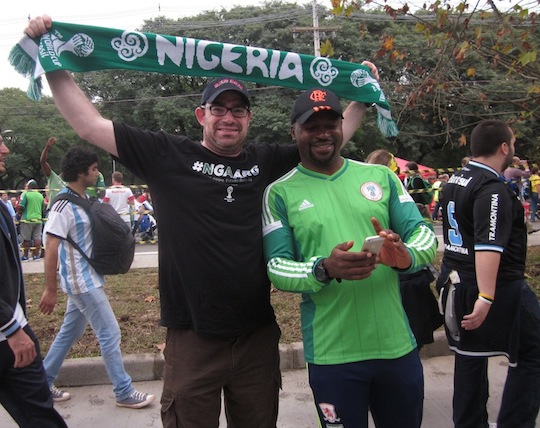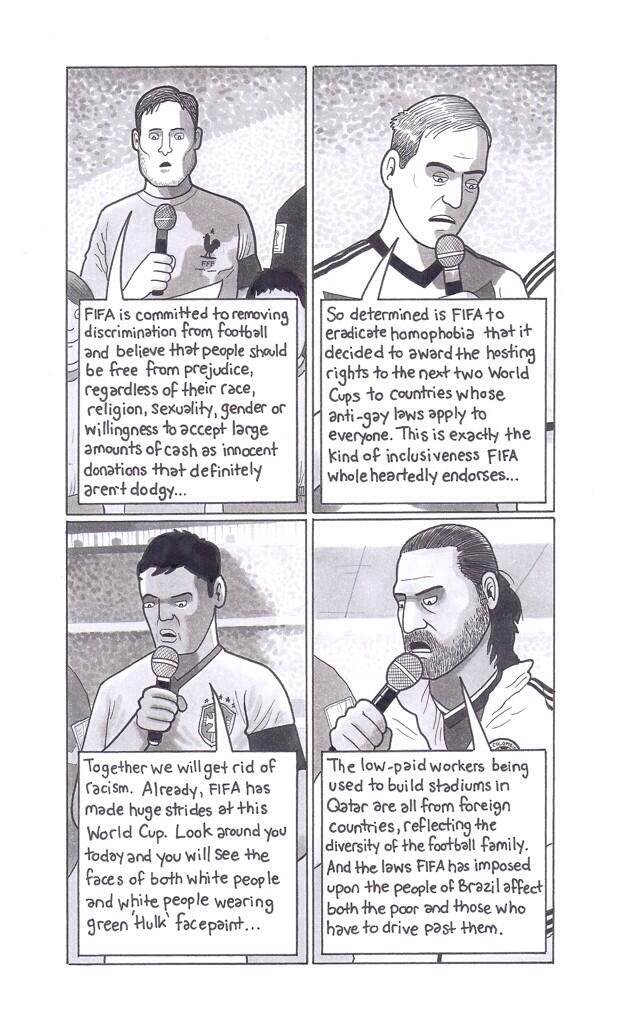Part 2 of my interview with Boyzzz Khumalo (part 1 is here) opens with a description of the harrowing injury that prematurely ended his Major League Soccer career.
Boyzzz reflects on the inherent fragility of professional sports, the importance of higher education for life after soccer, and his extensive youth coaching experiences in both Soweto and in Michigan.
Boyzzz’s deeply personal commitment to community upliftment comes through in a detailed discussion of the challenges and hopes for the Umhlaba Vision Foundation. Anyone interested in getting involved or learning more about Umhlaba can send email to boyzzzkhumalo80 AT gmail.
Month: July 2014
Boyzzz Khumalo: From Soweto to Michigan
Thabiso “Boyzzz” Khumalo grew up in Soweto, South Africa, around the corner from the homes of two Nobel Peace laureates: Nelson Mandela and Archbishop Desmond Tutu. Like so many boys in the land of apartheid, he spent every moment of free time playing soccer and dreaming of becoming a professional player overseas. Unlike most of them, however, Boyzzz fulfilled his dream
On July 22, I sat down with Boyzzz for an interview on the campus of Michigan State University. We’d been hoping to do an interview ever since we met in November 2013 when he visited my “Sport in African History” seminar for a screening and discussion of Invictus.
This week was an especially opportune time to chat about Boyzzz’s sporting life because on Sunday, July 27, Lansing United, his current team, travels east to New Jersey to play a National Premier Soccer League semifinal against New York Red Bull Under-23.
How does a young man from Soweto end up playing in Michigan? In part 1 of our interview, Boyzzz shares memories of anarchic pickup games in Soweto; his first experience in the U.S. during a youth tournament that would change his life; and then scoring his first MLS goal for DC United.
Boyzzz also discusses the work of the Umhlaba Vision Foundation–a nonprofit organization he founded in 2007 with two South African friends. The goal of Umhlaba (meaning “world” in the Zulu language) is to change the lives of young Sowetans by creating a positive development environment through sport and education and bringing student-athletes to the United States. For more information about the foundation please email Boyzzz (boyzzzkhumalo80 AT gmail).
Don’t forget to come back tomorrow for part 2 of the interview!
I chatted about the 2014 World Cup with Assumpta Oturu on KPFK Pacifica Radio‘s Spotlight Africa program.
We analyzed Brazil’s historic collapse, Germany’s youth development policies, club versus country loyalties, African teams’ performances and what can be done to improve their results in global football.
Listen to the entire July 19, 2014, show here.
Radio talk show host, author, and political analyst Eusebius Mckaiser spoke with Robin Petersen, CEO of the South African Football Association’s development agency, about what is going wrong and what needs to be done about the future of Bafana Bafana—the South African men’s national team.
Peterson has an unusual background for a South African football administrator. He owns a construction company and holds a PhD in Religion and Ethics from the University of Chicago Divinity School. Since 2001, Peterson has held important positions, including as CEO of SAFA and the domestic Premier Soccer League. In his new role at the helm of SAFA’s Development Agency, Peterson’s job is to ensure that the football development plan known as SAFA Vision 2022 is implemented.
In conversation with Eusebius and his listeners, Petersen touches in general terms on a 7-point plan that includes a national football philosophy; youth teams and academies; coach education; football infrastructure; and sports science. The complete absence of a sense of history in his remarks underscores a serious problem within South African football: an unwillingness to deal honestly and productively with what has already been said, tried, and failed in the two decades since the end of apartheid and the birth of democracy. (For two different, but complementary, critiques of South African football development, click here and here).
Despite Petersen’s best intentions and SAFA’s more sophisticated packaging, it seems that, once again, the latest development plan amounts to little more than a public relations campaign.

Guest Post by *Derek Charles Catsam
I recently returned from the 2014 World Cup in Brazil. It was a remarkable experience in a beautiful country. Everywhere we went people were gracious, joyful hosts. We ate fantastic churrasqueira (the Brazilian barbecue that will fuel my dreams for months) and drank among friends. The games were tremendous, the colorful visiting fans (with special mention to the dancing, chanting, singing, drinking Argentine throngs) made the World Cup the event that it is. The protests were more intermittent than expected. But the issues raised were as valid as ever.
I was based in Porto Alegre in the state of Rio Grande do Sul on Brazil’s southern border with Uruguay and Argentina. I attended four matches in Estadio Beria-Rio, the home of Sports Club Internacional: France-Honduras, Algeria-South Korea, Argentina-Nigeria, and the round of 16 match pitting eventual champions Germany against the Algeria. With 32 teams competing, the first two weeks of the World Cup are an unparalleled Carnival of Nations. Porto Alegre was in the midst of a Brazilian winter, hardly freezing, but occasionally raw and damp. The bikinis and swimming shorts that many of you saw as the regular going-to-commercial interludes on ESPN were many hundreds of miles north.
The tournament, which equaled the most goals (171) ever scored in a World Cup, was spectacularly entertaining and Germany is certainly a worthy champion. But once the confetti cleared, the last drinks were downed, tourists returned home, and Brazilians shook off the shameful way the Seleção flamed out of the tournament (and I do not for one second believe that the presence of Thiago Silva and Neymar against Germany and the Netherlands would have made much difference—Brazil’s problems were systemic) a familiar question looms: Was hosting the World Cup worth it?
